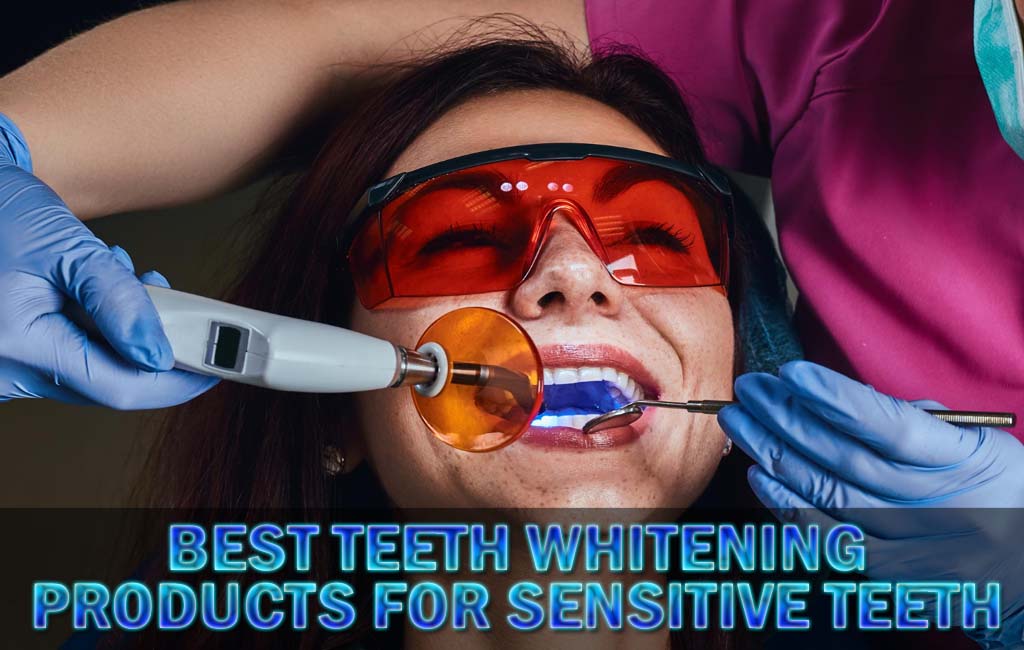Having sensitive teeth doesn’t mean you have to give up on achieving a bright, radiant smile. Many people with sensitive teeth shy away from whitening products because of fear of discomfort, pain, or damage to enamel. Fortunately, modern dentistry offers several best teeth whitening products for sensitive teeth that are both effective and gentle. In this article, we explore the top options and provide expert tips to maintain a healthy, white smile without aggravating sensitivity.
Understanding Sensitive Teeth
Teeth sensitivity occurs when the enamel, the protective outer layer of the tooth, wears down, exposing the dentin or inner layers. This can make teeth more vulnerable to hot, cold, or acidic foods. Whitening products that are too harsh may trigger pain or worsen sensitivity, which is why selecting products specifically formulated for sensitive teeth is essential.
It’s important to understand that sensitive teeth require careful handling during any whitening procedure. This is why the best teeth whitening products for sensitive teeth are designed with lower peroxide levels and added desensitizing ingredients.
Key Features to Look for in Whitening Products for Sensitive Teeth
- Enamel-Safe Formulas: Always choose products that are gentle on enamel to prevent erosion.
- Low Peroxide Content: Whitening agents with minimal peroxide or even peroxide-free options reduce irritation.
- Added Desensitizing Ingredients: Look for potassium nitrate, fluoride, or aloe vera to soothe sensitive teeth.
- Gentle Application Methods: Products like toothpaste, whitening pens, or soft whitening strips are safer for sensitive teeth than aggressive treatments.
Best Teeth Whitening Toothpaste for Sensitive Teeth
Whitening toothpaste formulated for sensitive teeth is a gentle yet effective option for daily use. Unlike traditional whitening toothpaste, these formulas often contain fluoride and mild abrasives to reduce enamel wear while gradually removing stains.
Top Recommended Toothpaste Options:
- Sensodyne Pronamel Gentle Whitening: Specifically formulated for enamel protection, it gently removes stains while reducing sensitivity.
- Crest 3D White Brilliance Gentle Whitening: Offers gradual whitening without harsh chemicals.
- Colgate Sensitive Whitening: Combines sensitivity protection with stain removal.
For best results, use these toothpastes twice daily and pair with a soft-bristled toothbrush. Gradual whitening is safer for sensitive teeth and ensures long-term enamel health.
Best Whitening Strips for Sensitive Teeth
Whitening strips are an effective home treatment but can sometimes cause discomfort for sensitive teeth. Brands designed for sensitivity provide a gentler alternative, often with lower peroxide content.
Recommended Whitening Strips:
- Crest 3D White Whitestrips Gentle Routine: Designed specifically for sensitive teeth with a reduced peroxide formula.
- Rembrandt Gentle White Whitening Strips: Offers visible whitening without irritating sensitive teeth.
When using whitening strips, follow the instructions carefully and avoid prolonged use. Limiting application to recommended durations helps prevent enamel damage and discomfort.
Whitening Gels and Pens for Sensitive Teeth
Whitening gels and pens offer a targeted approach, allowing you to apply whitening agents directly to stained areas. Many gels formulated for sensitive teeth contain ingredients to minimize irritation and pain.
Recommended Whitening Gels and Pens:
- Opalescence Go Gentle Whitening Gel: Perfect for sensitive teeth, offering a balance of whitening and comfort.
- Colgate Optic White Sensitive Pen: Easy-to-use pen with low peroxide content for spot whitening.
Tips for minimizing sensitivity while using gels:
- Apply for shorter durations if you feel discomfort.
- Use desensitizing toothpaste before and after application.
- Follow the recommended frequency and avoid daily overuse.
Natural Teeth Whitening Options for Sensitive Teeth
If you prefer a chemical-free approach, natural whitening options can provide subtle results while keeping sensitivity at bay. However, these methods usually take longer to show effects.
Safe Natural Remedies:
- Baking Soda: A mild abrasive that helps remove surface stains when used sparingly.
- Activated Charcoal: Can absorb stains but should be used carefully to avoid enamel wear.
- Coconut Oil Pulling: Swishing oil in the mouth may reduce plaque and mildly whiten teeth.
While natural remedies are gentle, combining them with regular dental hygiene ensures better results. Avoid acidic or overly abrasive ingredients that can worsen sensitivity.
Professional Whitening Treatments for Sensitive Teeth
For faster and more noticeable results, professional whitening treatments are an option. Dentists can provide customized solutions for sensitive teeth, including in-office treatments and take-home kits with controlled whitening agents.
Benefits of Professional Whitening:
- Customized formulations for sensitive teeth.
- Reduced risk of enamel damage.
- Faster and more even whitening results.
Professional treatments are ideal for those with moderate to severe stains who need a balance between effectiveness and safety.
Tips for Maintaining a White Smile Without Aggravating Sensitivity
- Brush twice daily with a soft-bristled toothbrush.
- Avoid acidic foods and beverages that can weaken enamel.
- Use desensitizing toothpaste regularly to maintain comfort.
- Limit the use of harsh whitening products and follow instructions carefully.
- Schedule regular dental check-ups to monitor enamel health.
Conclusion
Whitening teeth with sensitivity doesn’t have to be painful or risky. By choosing the best teeth whitening products for sensitive teeth and following safe practices, you can achieve a bright smile without discomfort. From specialized toothpaste and gentle strips to whitening gels, pens, and professional treatments, there are many effective options available. Pair these products with proper dental care and lifestyle habits to maintain long-lasting results while protecting your sensitive teeth.
Remember, gradual whitening is always safer than aggressive treatments, and a healthy smile starts with enamel protection. With the right products and techniques, even sensitive teeth can shine bright.
Frequently Asked Questions About Best Teeth Whitening Products for Sensitive Teeth
What are the best teeth whitening products for sensitive teeth?
The best teeth whitening products for sensitive teeth are specially formulated to minimize discomfort while effectively removing stains. These usually include low-peroxide toothpastes, gentle whitening strips, and desensitizing gels that protect enamel while brightening your smile.
Can I use regular whitening products if I have sensitive teeth?
Using standard whitening products may increase pain or sensitivity. It’s better to choose products specifically labeled as suitable for sensitive teeth, as they contain gentler ingredients that reduce the risk of irritation.
How long does it take to see results with sensitive teeth whitening products?
Results vary depending on the product and severity of stains. Toothpaste and natural remedies may take a few weeks, while gentle whitening strips or professional treatments can show noticeable results within a few days to a week.
Are whitening strips safe for sensitive teeth?
Yes, but only if they are designed for sensitive teeth. These strips have lower peroxide levels and provide gradual whitening, reducing the likelihood of discomfort compared to standard whitening strips.
Can natural remedies effectively whiten sensitive teeth?
Some natural remedies like baking soda, activated charcoal, and coconut oil pulling can gently remove surface stains. However, their results are subtle and take longer compared to the best teeth whitening products for sensitive teeth available commercially.
How often should I use whitening toothpaste for sensitive teeth?
It is generally safe to use whitening toothpaste for sensitive teeth twice daily. Consistent use helps gradually lighten stains without increasing sensitivity or damaging enamel.
Are professional whitening treatments suitable for sensitive teeth?
Yes, dentists can provide customized treatments specifically for sensitive teeth. Professional options include in-office treatments or take-home kits with controlled peroxide levels to ensure safe and effective whitening.
Can whitening pens be used on sensitive teeth?
Whitening pens are a good option for sensitive teeth, especially those formulated with lower peroxide concentrations. They allow precise application to stained areas while minimizing irritation.
What ingredients should I look for in sensitive teeth whitening products?
Look for enamel-safe formulas with added desensitizing ingredients like potassium nitrate, fluoride, or aloe vera. These help protect sensitive teeth while gradually whitening them.
How can I maintain a bright smile without aggravating sensitivity?
Use the best teeth whitening products for sensitive teeth consistently, avoid acidic foods, brush gently with a soft-bristled toothbrush, and incorporate desensitizing toothpaste into your routine. Regular dental check-ups also help maintain enamel health and prevent increased sensitivity.



